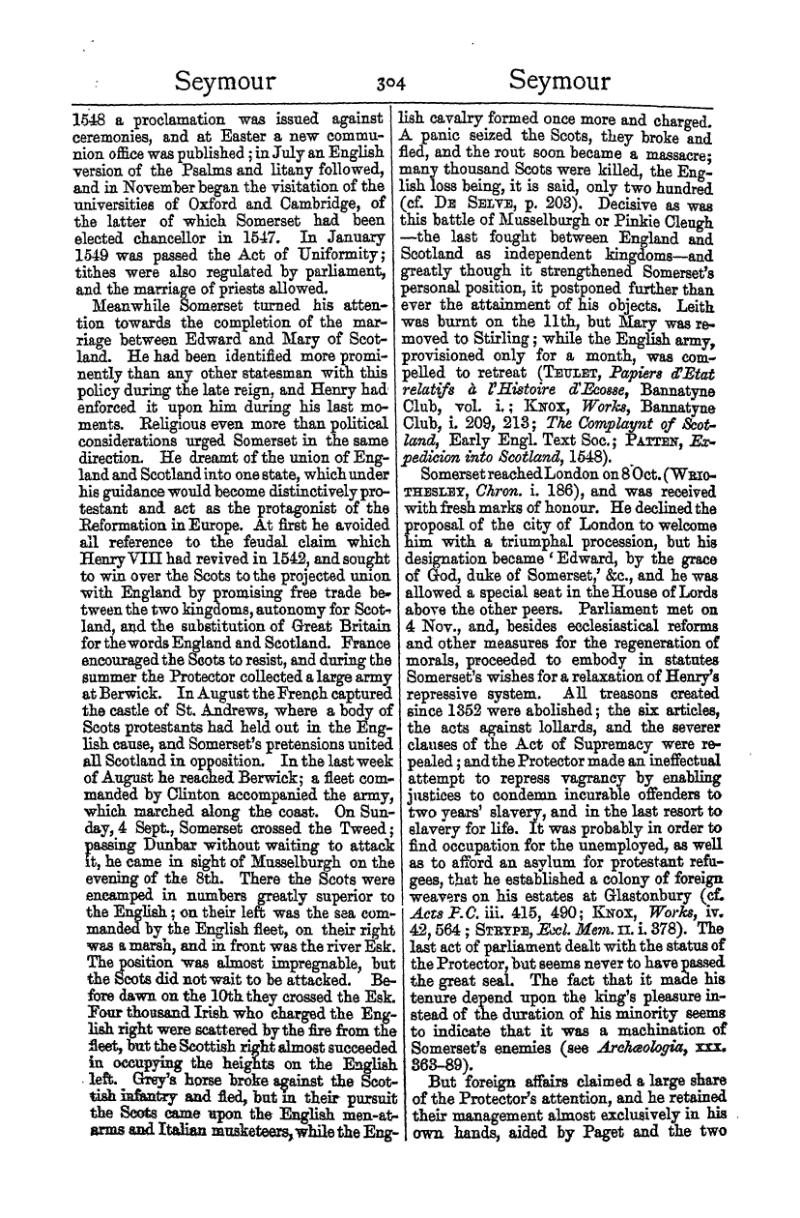1548 a proclamation was issued against ceremonies, and at Easter a new communion office was published; in July an English version of the Psalms and litany followed, and in November began the visitation of the universities of Oxford and Cambridge, of the latter of which Somerset had been elected chancellor in 1547. In January 1549 was passed the Act of Uniformity; tithes were also regulated by parliament, and the marriage of priests allowed.
Meanwhile Somerset turned his attention towards the completion of the marriage between Edward and Mary of Scotland. He had been identified more prominently than any other statesman with this policy during the late reign, and Henry had enforced it upon him during his last moments. Religious even more than political considerations urged Somerset in the same direction. He dreamt of the union of England and Scotland into one state, which under his guidance would become distinctively protestant and act as the protagonist of the Reformation in Europe. At first he avoided all reference to the feudal claim which Henry VIII had revived in 1542, and sought to win over the Scots to the projected union with England by promising free trade between the two kingdoms, autonomy for Scotland, and the substitution of Great Britain for the words England and Scotland. France encouraged the Scots to resist, and during the summer the Protector collected a large army at Berwick. In August the French captured the castle of St. Andrews, where a body of Scots protestants had held out in the English cause, and Somerset's pretensions united all Scotland in opposition. In the last week of August he reached Berwick; a fleet commanded by Clinton accompanied the army, which marched along the coast. On Sunday, 4 Sept., Somerset crossed the Tweed; passing Dunbar without waiting to attack it, he came in sight of Musselburgh on the evening of the 8th. There the Scots were encamped in numbers greatly superior to the English; on their left was the sea commanded by the English fleet, on their right was a marsh, and in front was the river Esk. The position was almost impregnable, but the Scots did not wait to be attacked. Before dawn on the 10th they crossed the Esk. Four thousand Irish who charged the English right were scattered by the fire from the fleet, but the Scottish right almost succeeded in occupying the heights on the English left. Grey's horse broke against the Scottish infantry and fled, but in their pursuit the Scots came upon the English men-at-arms and Italian musketeers, while the English cavalry formed once more and charged. A panic seized the Scots, they broke and fled, and the rout soon became a massacre; many thousand Scots were killed, the English loss being, it is said, only two hundred (cf. De Selve, p. 203). Decisive as was this battle of Musselburgh or Pinkie Cleugh—the last fought between England and Scotland as independent kingdoms—and greatly though it strengthened Somerset's personal position, it postponed further than ever the attainment of his objects. Leith was burnt on the 11th, but Mary was removed to Stirling; while the English army, provisioned only for a month, was compelled to retreat (Teulet, Papiers d'Etat relatifs à l'Histoire d'Ecosse, Bannatyne Club, vol. i.; Knox, Works, Bannatyne Club, i. 209, 213; The Complaynt of Scotland, Early Engl. Text Soc.; Patten, Expedicion into Scotland, 1548).
Somerset reached London on 8 Oct. (Wriothesley, Chron. i. 186), and was received with fresh marks of honour. He declined the proposal of the city of London to welcome him with a triumphal procession, but his designation became ‘Edward, by the grace of God, duke of Somerset,’ &c., and he was allowed a special seat in the House of Lords above the other peers. Parliament met on 4 Nov., and, besides ecclesiastical reforms and other measures for the regeneration of morals, proceeded to embody in statutes Somerset's wishes for a relaxation of Henry's repressive system. All treasons created since 1352 were abolished; the six articles, the acts against lollards, and the severer clauses of the Act of Supremacy were repealed; and the Protector made an ineffectual attempt to repress vagrancy by enabling justices to condemn incurable offenders to two years' slavery, and in the last resort to slavery for life. It was probably in order to find occupation for the unemployed, as well as to afford an asylum for protestant refugees, that he established a colony of foreign weavers on his estates at Glastonbury (cf. Acts P.C. iii. 415, 490; Knox, Works, iv. 42, 564; Strype, Eccl. Mem. ii. i. 378). The last act of parliament dealt with the status of the Protector, but seems never to have passed the great seal. The fact that it made his tenure depend upon the king's pleasure instead of the duration of his minority seems to indicate that it was a machination of Somerset's enemies (see Archæologia, {sc|xxx}}. 363–89).
But foreign affairs claimed a large share of the Protector's attention, and he retained their management almost exclusively in his own hands, aided by Paget and the two
